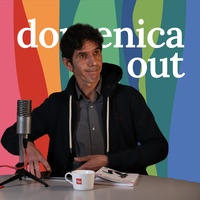
In this episode, Pablo Lombó presents Storia di Mariquita, a tale by the Mexican writer Guadalupe Dueñas, born in 1910 in Guadalajara, the capital of the state of Jalisco.
The author, raised in a traditional and Catholic environment, uses her writing to express the inner tensions, pressures, and social expectations that women had to face in the first half of the 20th century.
In this tale from 1958, the writer addresses the theme of death and its acceptance through a macabre and fantastical narrative, somewhat gruesome, that challenges reality. The trigger is the tiny body of the deceased older sister, who died at birth and is preserved by the father, and later by the now-adult sisters, in a jar of chilies. This presence is unsettling; it symbolizes suffering, but at the same time, it is a reassuring presence.
Storia di Mariquita is another tale from the anthology Storie irriverenti.

Nella nuova puntata del podcast, Pablo Lombó parla di Rafael Muñoz e del suo racconto Il feroce leader dei ribelli, un altro brano da leggere nelle Storie irriverenti.
Pubblicato nel 1928, è un racconto sulle brutalità della guerra ma anche, o forse soprattutto, un racconto sulla distorsione della realtà e sulla fragilità della storia
Sorprendentemente attuale.

In this episode, Pablo talks about Francisco Hinojosa, author of the story “Domenica out,” one of the pieces included in “Irreverent Stories.”
Francisco Hinojosa, born in Mexico City about 60 years ago, is a master of irony and one of the greatest storytellers of his generation, capable of mixing irony with deep social critique.
‘Domenica out’: a direct and engaging read, 100 numbered paragraphs, an innovative style reminiscent of comic strips.

In the first episode, Pablo tells us how the idea for this collection came about, the reasons that guided him in selecting the stories, and the challenges of translation, as each author has their own unique style, a distinctive voice, and their own language.

Tiziana Bertaccini talks about Peru, a country with a rich cultural heritage influenced by the Inca Empire.
Currently, Peru is experiencing a complex political context and sees strong social mobilization against corruption.
After various shifts between democracy and authoritarianism, with Fujimori's regime representing a crucial moment for human rights violations and corruption, building a stable democracy is now one of the critical challenges for Peru's future.

Tiziana Bertaccini talks about the rise of the new right-wing parties in Latin America: authoritarian and populist policies based on traditional values, opposition to the left and the "woke" ideology, belonging to a global movement.
OTTO Editore
Piazza Gran Madre di Dio 7 - 10131 Torino
Ph. +39 011 2976257
E-mail: mail@otto.to.it
VAT N. IT07483380015